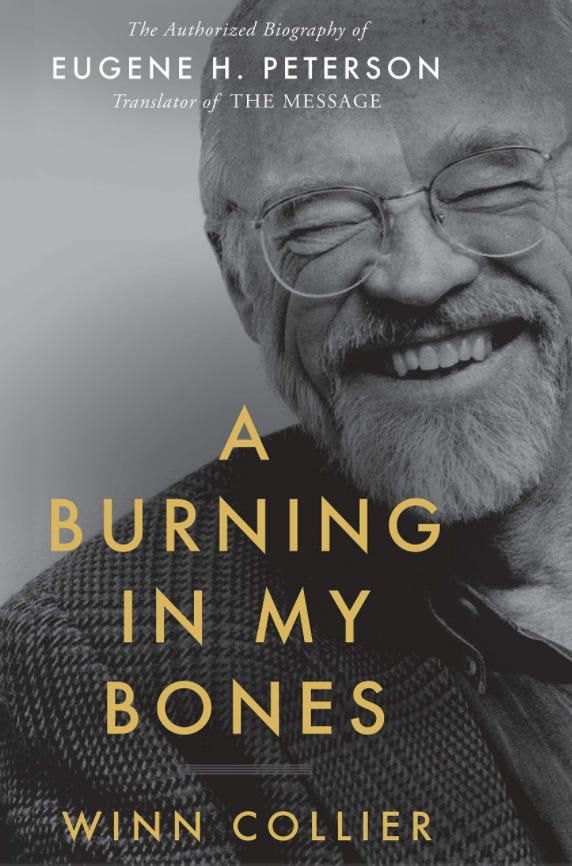Burning in My Bones: Shaping is Guidance
The Lord works in us through what happens in our life. It’s wiser not to get too precise here. I have found it easier to say “I learned this through that experience” than to say “The Lord did that experience to me so I would learn this.” Perhaps you agree.
Eugene Peterson found his way into the Lord’s calling for him through life’s experiences.
Photo by Florian Wehde on Unsplash
In our next readings in Winn Collier’s biography of Eugene Peterson called A Burning in My Bones (pp. 43-77; for the reading plan), we look at Peterson’s college experience at Seattle Pacific (on the track team yea! Drake Relays yea!) and his seminary life in New York City, along with the beginnings of pastoral experience. These made him the kind of pastor he became.
How do your education, formation and experiences coalesce into who you are today?
How has your shaping been your guidance?
For a man who chased a life of contemplation and writing, his introversion was at times transcended. Perhaps another way of saying it is that this introvert was also a leader both in high school and in college – and a pastor much of his life, leading or otherwise. Introverts can be exceptional leaders. In fact, one of his college friends said he had a “large personality” (44). He played basketball and ran on the track team (with Gordon Fee). He got a tattoo, which irritated his mother.
In a period of spiritual numbness he found an unlikely shaping influence, Reuben Lance, who talked with him and treated him as a person. Years later Peterson called Reuben, a dying man, to tell him the impact on his life, and Reuben cried.
He decided to marry a woman and never did marry her.
He later would marry Jan. Talk about guidance through shaping. Jan shaped his life.
That brief one-day attempt to plant a church in Townsend Montana was funny. Home he returned and then off to seminary – think of what would have happened had he stuck out that church plant. More shaping, the kind that means turning back, that guided his path.
He left Montana and headed to NYC to Biblical Seminary, now New York Theological Seminary. He was shaped dramatically in that seminary by Robert Traina.
I found another item in his story that became reflective for me. How about the personalities Peterson knew? Gordon Fee, Phil Jackson of Chicago Bulls fame, Pat Robertson his prayer partner in seminary, Robert Traina, George Buttrick, Frederick Buechner, and Abraham Vereide, whose ministry developed into the President’s Prayer Breakfast.
Not all of us have such personalities in our life but the names made me think of who was influential in my life, or who I knew who became known, and even who I knew then that I had no idea would become as known as they are today! Or even who I knew who stayed in the background but had a major influence.
How about you? Who are those people in your life?
Guidance for many is not all of a sudden perfectly clear. For most it is not. I really like this line by Collier: “His life and work had been more like tracing a scent than following a map” (60). Do I hear an Amen!?
Not everyone chasing a scent finds its source, but the chase was all worth it. The scent shapes the path we follow, the turns we navigate, and the direction we go.
In seminary Peterson found one of his greatest passions: Bible reading as conversation.
The Bible – as Eugene had known it – offered principles for moral living, artillery for theological skirmishes, and clichés providing therapeutic salve. His church had implicitly used it as a textbook or occasionally even a weapon, but no one had ever guided him into the wonder, beauty, and artistry of the ancient pages (68).
This is what he learned from Robert Traina, whose Methodical Bible Study was a favorite of my “inductive Bible study” class in undergraduate. That book helped teach me to read the Bible myself and to see what I saw and to listen to what I heard. Peterson’s personal reading of the Bible became a conversation. No better term for how best to read the Bible. None.
The beginnings of his perception of pastoral work came to him from the well-known George Buttrick, and this maybe one of the most significant statements describing what became Peterson’s way.
For two hours every Tuesday and Thursday afternoon, I walk through the neighborhood and make home visits. There is no way I can preach to these people if I don’t know how they are living, what they are thinking and talking about. Preaching is proclamation, God’s word revealed in Jesus, but only when it gets embedded in conversation, in a listening ear and responding tongue, does it become gospel (74).
Buttrick was not eloquent but he was a pastor speaking to the people, and that became the way for Peterson.
In fact, in the previous chapter Collier reflected this theme when he said Eugene thought a church shouldn’t be any larger than having names of parishioners known to the pastor. In other words, a pastor is someone who know the names of those in the church. Peterson, never the legalist about such things, was making an important point — and I wonder, too, what you think of this one?
He was shaped by his life and his life guided him into life as a contemplative writing pastor.




Collier's writing of people and experiences that influenced Peterson led to pleasant reflection on who and what stayed in my "bones". I first thought of a professor who shared truth and great compassion in a private conversation in college when I learned my mother was terminally ill. It was the genuine caring that cushioned, and indelibly imprinted the wise words he shared. To this day, as I sit both personally and professionally with people experiencing loss, that is with me. Another professor in grad school marked me by an assignment. It was a course in multicultural history. I thought I'd be going on a very different journey. But the challenge was to explore our own roots as far back as possible. To understand our own "culture". I've looked at "culture" in a much broader way ever since. I came to know myself better on that journey. Colleagues, many of whom are now friends have enriched my life and perspectives. In spite of being in the final season of my career, I to seek out supervision and host a network group because it enriches my life and enhances my work. The perspectives of others broadens my own. My adult children have marked me, as we converse about authors, speakers, preachers, and experiences. I so loved reading of Buttrick. I look forward to learning more of him. Finally, I could not read without apparent contrasts to religious church cultures that focus more on the messenger than on the Object of the message.
Thanks, Scot, for hosting this discussion and raising these questions. I'll respond to your first question as to how my education, formation, and experiences coalesce into who I am today. I attended and graduated from Western Seminary in Portland, Oregon in the mid 1980s. It was a great experience. But one of the most shaping influences on my life during those years was my job as an apartment manager. I managed 53 units in two buildings on opposite sides of the street. My wife and I lived in one of the units, and it was 24 blocks from downtown (on the southeast side of the city). At the time, I sometimes resented the way my work "interfered" with my seminary training. I envied a classmate who had family money and bought a house on the slopes of Mount Tabor (not far from where Jim Elliot grew up) and spent his three years studying without needing to pursue employment. Yet God had a different path for me--one that I desperately needed.
The apartment complex I managed, Matawan Manor, provided the context for me to learn how to pastor people and to work with others from different cultures. The tenants were Korean, Caucasian, Italian, African-American, Hmong, etc. After a morning parsing Hebrew verbs and discussing theology at Western, I returned to a world of replacing hot water heaters, patching holes in walls, fixing leaky faucets, and handling all kinds of tenant concerns and complaints. I dealt with domestic disputes, tenants with mental illness, and even drove a young man home after he came to visit a female tenant and ended up pulling a knife on her boyfriend. When the other guy pulled a knife, the young man fled and showed up at "the manager's apartment" and asked if I would drive him home. So I did (and took the opportunity to share the gospel with my captive audience!). Another time, I called for medics when a young lady punched her fist through her living room window during a fight with her boyfriend. Once at midnight, I answered the door to find a young man asked me if I would co-sign a loan for him so he could buy a car. I counseled one young couple who frequently ended their evening by throwing lamps and books and dishes at each other. I counseled another young man and his girlfriend (I was replacing the hot water heater in their apartment) to pursue adoption rather than abortion for an unwanted pregnancy. I couldn't believe how angry he got at me. He wasn't going to "let someone else" raise his child! I do not have time to tell about the tenant whose toilet exploded or the time when I let two thieves into an apartment where they claimed to be guests. They had just robbed the neighborhood Safeway store. Thankfully, they were apprehended without incident.
Now, as I look back, I thank God for "Matawan Manor Seminary." My Christian parents didn't shelter me, and I saw my dad, a pastor, deal with similar kinds of people and situations. But I needed this place, this context to learn for myself how to deal with people. Many years later, I'm still learning. But the lessons during my seminary years were formative.
By the way, I smiled when I read about Eugene's 18-hour effort to plant a church in Townsend, Montana! My two daughters and one of my sons played basketball there often during their high school years. The Townsend Bulldogs were in our conference, and I've fly fished the Missouri River where Eugene would have walked. What a (false) start to his pastoral vocation!